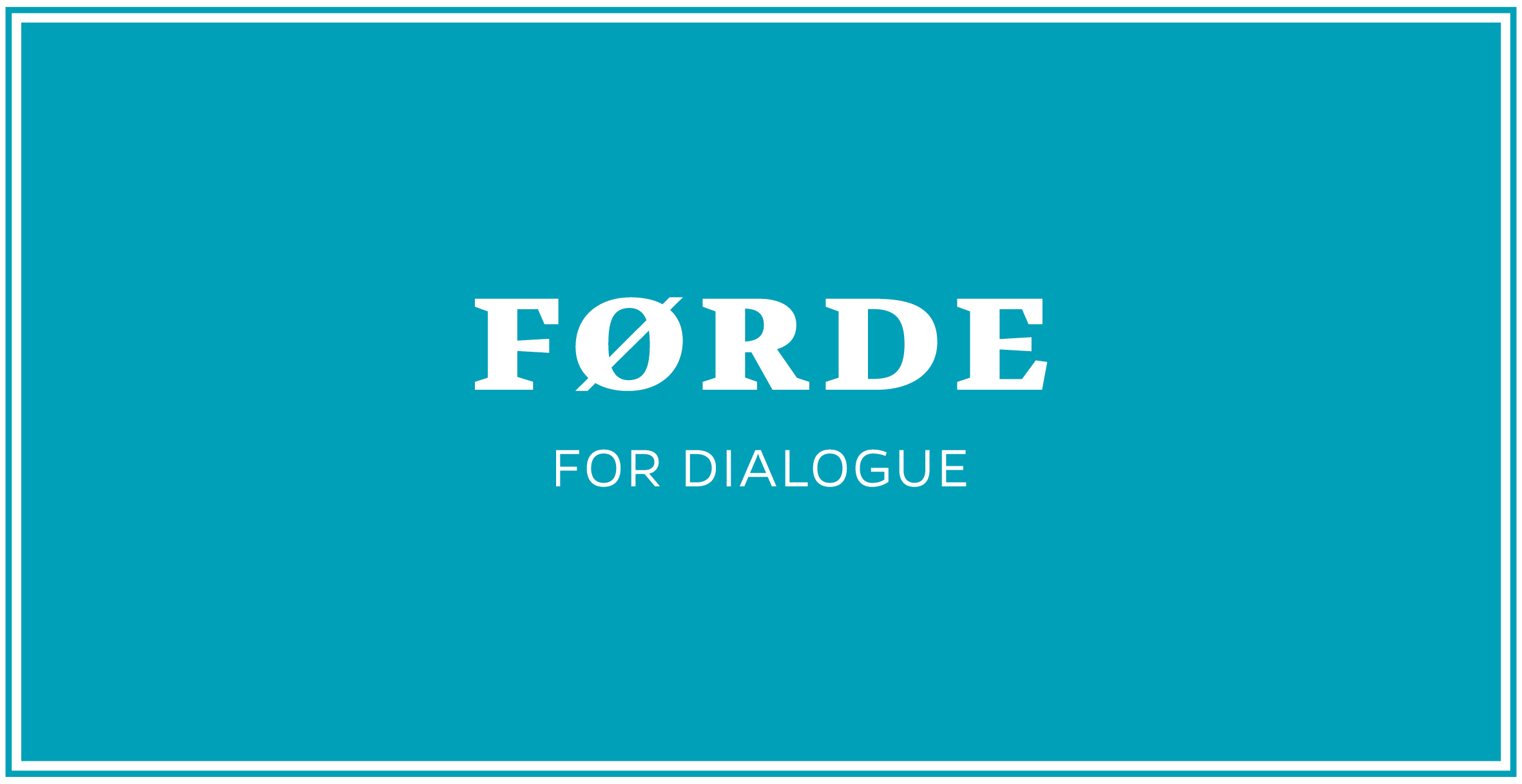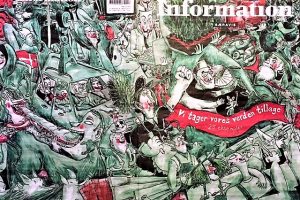
TAKING BACK OUR WORLD
Ever since I started my studies in political science at the University of Copenhagen in September 1969, I have subscribed to the Danish daily newspaper called INFORMATION. Almost 50 years down the road, I find it almost impossible to start my day without running through the pages, to register if there is anything in particular I want to read now or later in the day. This is actually an exercise quickly finalised, since this is probably the smallest newspaper in the country based on number of pages. Around 20 pages in all on a normal day, and then more in the Friday and Saturday editions.
I guess part of my fascination with INFORMATION is that it offers ‘slow-food’ articles in the way that I prefer. Many well researched and lengthy articles about pertinent issues of our day, and often at the forefront of holding those in power accountable, be they powerful politicians or powerful people in the world of money. Yes, admittedly the paper will often take positions that I personally agree with, and this could be another reason for subscribing, why not! But I and the paper are not consistently in agreement about where the world is going and what we should do to pick up the pieces.
However, one more reason for my consistent support for INFORMATION is its insistence on prioritizing issues about ‘sustainability’ in the broadest sense of the concept. This started way back in the 1980’ies, before the Danish edition of the Brundtland Commission Report on “Our Common Future” was published (which I was one of the people involved in by the way). Before others, the paper recognized that this would be a defining question for humanity, and therefore also for Denmark and the Danes.
We take back our world
On May 3, the paper published what they call a ‘special issue’, with the title “We take back our world”. The editors have decided to present 25 specific real life examples of what ‘ordinary’ Danes are doing to change their daily realities in a different and positive direction, and thus show the centre of our political system that they also want to contribute and influence things. This is in line with what I have tried to do over the years, including in my recent book from December 2016 about “Engaging with democracy globally”: to show positive and optimistic examples in a world which is most often seen as moving in the wrong direction.
I would have loved to just post a reference to the English edition of this special issue, but this is not available. I have therefore decided to present a brief summary of the 25 small and larger examples of innovative models, because I feel that this offers a more productive and reflective view of my country, Denmark, than the superficial reference to ‘the Danes being the happiest people in the world’.
I would like to encourage all of you to think about similar cases of new and innovative community models from your own country. I would be most happy to post such stories on my website.
[1] Light in Darkness
Believe it or not, but ‘Darkness’ is actually the name of a small community in the western part of Denmark, with a population of 1.500 – and with the same challenges of surviving as a productive and attractive community like many other small communities in the country. The young people move elsewhere when they have finished their education. Few outsiders feel attracted to settle down in Mørke. But a group of around 150 of the 1.500 villagers decided that rather than sit around and wait for something to happen from the top, they would themselves make sure that ‘Light would come to Darkness’. Or as some stated: “If it’s broken – fix it”. Several projects have been started, with different groups of people doing the work. Read more here: www.mørke.dk.
[2] Denmark eating together
Every year, the People’s Movement Against Loneliness organise events around the country, where people who are lonely can meet and share time together. It is found that more than 200.000 people in Denmark suffer from a feeling of loneliness. Read more here: www.danmarkspisersammen.dl.
[3] Hotel Skovsgård
A hotel owned by 370 partners in a small village of only 870 people, with 14 plus staff mostly in ‘protected’ types of jobs (like people with mental problems), started back in 1983. The vision is to offer vulnerable people some opportunities of work, and to attract more people to the community. Read more here: www.skovsgaardhotel.dk.
[4] Agricultural funds
Two agricultural funds try to build a bridge between the rural areas and people in cities by offering citizens to buy farms collectively, and then offering the farmers to manage the land on the condition that it is done with ecological methods. This is happening at a time when the number of farms in Denmark is falling dramatically, and land is being bought by foreign companies, possibly primarily for speculative profit purposes. Read more here: www.samsoekologisk.dk and www.jordbrugsfond.dk.
[5] Ørsted Inn
In 2013, the inn in the small village of Ørsted was threatened by bankrupcy and closure, but some of the villagers refused to accept this outcome. They encouraged villagers to invest in ‘people shares’, and 567 villagers signed up. This provided enough money to renovate and upgrade the inn, and more people have joined, making continous development possible. Volunteers have invested 6.000 hours of work to renovate the inn. In a recent meeting, one villager suggested to change the signpost at the entry of the village to state: “Ørsted – a happy village”. Read more here: www.oerstedkro.dk.
[6] GoMore
An internet-based service, where private citizens can organise driving together or rent their car to other private citizens. Half a million Danes use this service on a regular basis. Because it is practical, but for many also because it is a good way of meeting others. Read more: www.gomore.dk.
[7] The Friendly Residents
A group of citizens all over the country, organising activities for asylum seekers and refugees to make them feel at home. It all started back in 204, when Denmark – like other European countries – received large groups of refugees from Syria in particular, but other countries as well. Today, there are groups in around 100 Danish cities, organising all kinds of activities – just meeting with the refugees, finding furniture when they move into an apartment, offering help to the children going to school, cooking dinners together. Read more: www.venligboerne.dk.
[8] do:topia
This is the name of an online activist group with the vision of making all of us co-creators of our own digital reality. One activity is to organise more than one hundred eight grade students to teach them to recognize ‘fake news’ and create their own ‘tone’ on the internet.
[9] Free farmers – Living land
Denmark has been an agricultural country for centuries, but it is increasingly difficult if not impossible for small farmers to survive in a very competitive and industrialised market, where you need many cows or pigs or chicken to surive. The Association of Small-scale Farmers gave up in 2003, when it was decided to merge with the large-scale farmers organisation. A few did not want to surrender, but decided to start the association called ‘Free Farmers – Living Land’. The vision is to produce with greater respect for nature and the environment, and to allow consumers to buy farm products locally. Read more here: www.levende-land.dk.
[10] The Common Good
A grassroots initiative of eight associations working for sustainable and ecological solutions, thus contributing to fight climate change. The immediate goal is to mobilise people around green ideas in the electoral campaign around the municipal elections taking place in November 2017. Read more here: www.detfaellesbedste.dk.
[11] The Village Forum
In the municipality of Sønderborg in the Southern party of the country, close to the border with Germany, the villages have organised them selves into 34 forums or groups, and thorugh the Village Forum, the 34 support each other and inspire each other. Like elsewhere, there are issues of ‘city versus village’, but in this case, the participants have decided not to make this the key issue. The would rather like to emphasize that both city and village need each other. Read more here: www.sonderborgkom.dk/landsbyforum/.
[12] Activists of the Lumber Room
This is an activist Facebook group, dedicated to fight ‘revenge pornography’ on social media, by contacting the parents of young people who share, request and exchange nude photographs.
[13] The Next Helpers
This is also an activist Facebook group with 17.000 members, who are dedicated to help each other as well as other people outside the group, who have one thing in common: they have been hit or hurt by the so-called ‘reforms’ enacted by various governments with the intention of forcing people to take a job, etc. This has resulted in lower levels of financial benefits if you are out of a job, with families not having enough money to provide enough food for their children.
[14] Conversation Salons
It all started with some people feeling that they missed a place to really talk together. They felt there were very few places where people who did nok know each other could meet, across generations and ideological positions. Most of the time we only meet people we agree with! Basically the idea was to ‘reinvent’ the shred feeling of belonging to a society and a state, and not focus so much on the individual as wee tend to do in this time and age. Read more here: www.samtalesaloner.dk.
[15] BK Vestia – a soccer club
A different type of soccer club. The objective is not to bring up players who will one day be on the national team or sold off to a professional club abroad. The idea is to create a space for young kids who can enjoy playing, but also enjoy being friends – and take care of them.
[16] Cryptohagen
Basically a series of informal meetings for those using the internet in one form or the other. The last Sunday of every month they get together to help people learn how they can protect their private lives, and how they can request the state and private companies to do the same. Read more here: www.cryptohagen.dk.
[17] Thorupstrand Coast Fishing Guild
The purpose of this Guild in a small fishing village on the northernmost coastline of Denmark is to secure the future of fishing and livelihoods for the young people in a very small community. This should be done in a sustainable manner, both from an ecological fishing point of view, and from a cultural point of view. Without coming together, this type of more traditional fishing directly from the beach, rather than from large industrial boats in the major harbours on the coast, would not have been possible. Fishing quotas would have been bought by rich fishing companies, and they would not care about the local community. Read more here: www.thorupstrandkystfiskerlaug.dk.
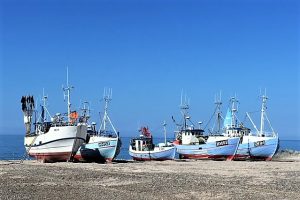
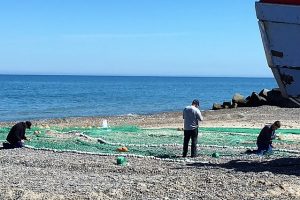
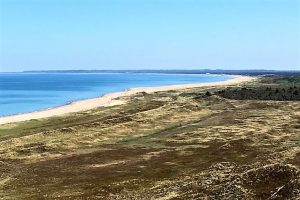
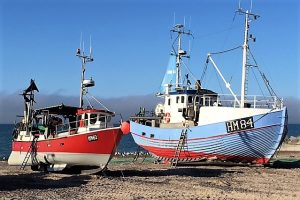
The small coastal village of Thorup Strand. The boats seem large when you stand next to them, but they are dwarfed by the industrial ships that are 90 meters long. Boats leave during the night and return in the afternoon, dragged into the water by a simple system rarely seen elsewhere. The village is located where the coastline bends to the left. Fishing is the only economic activity of importance, apart from tourism. Fishing is both hard work and dangerous. After having landed the fish, it is time to repair the nets. This type of fishing does not hurt the environment the way the industrial boats do.
[18] Vrads Grocery Store
A non-profit grocery shop that has existed for 25 years. It was started by 12 people back in 1992, at a time when the small village of Vrads with only 200 people was having difficulty surviving as a community. Since then the store has become a key landmark, a place where people not only shop, but also meet to talk. It is run by 25-30 volunteers. Read more here: www.vrads.dk.
[19] The Settlement
A professional civil society organisation, working to involve and include vulnerable citizens in civil society activities, fighting for their social and cultural rights, and ensuring that those most marginalised who fall through the social safety nets have a place to go. Read more here: www.settlementet.dk.
[20] logic & company
A building company managed collectively, with a vision of building in a sustainable manner and with social responsibility. It was started in 2001 by eight builders, and today there are 50 people employed. All employed are paid the same salary. Read more here: www.logik.dk.
[21] Green Foum
A network of around 150 associations interested in and working with nature and environment, plus individual citizens in the city of Vejle in the west of Denmark. There is a lot of practical activities involved, but basically it is also about doing things together. The slogan created by the groups is: “Knowledge creates attitutes, and engagement creates action”. Read more here: www.groentforum.dk.
[22] Breeding Ground
This project is about a group of people living together, without having a lot of financial debt, without polluting, and trying to live from local productions. So there is a part having to do with ‘living’, another about ‘agriculture’, and a third part is about ‘production’. It will start by buying a farm with cash, and 50-100 small enterprises will move in. 100 housing units will be established. Read more here: www.grobund.org.
[23] The Recycling and Repair Project
On average, every Dane throws away 13 kilo of electronic materials every year. Consequently, people have started working together to find solutions as to how electronics products can be recycled and reused. The motto seems to be that you should use things/products as long as you can!
[24] The Cooperative spirit of Langeland
Langeland is an island in the southern part of Denmark, and one of the areas that in recent decades has lost people and jobs. Families – and youth in particular – move away to the bigger cities that can offer education and jobs. A group of citizens have set up an umbrella organisation to help change this development. Groups are established to come up with proactical ideas about what could be done. You can either lie down and just give up – or believe that it is possible to change things! Read more here: www.andelstanken.dk/langeland/.
[25] The fellow citizens
This is a network of people in the inner North West city of Copenhagen, working to build local community groups across religion, social background, education, age and other diversities, with the intention of strengthening the democratic strength of the members. Read more here: www.medborgerne.dk.
